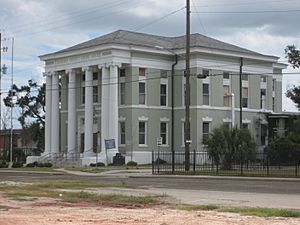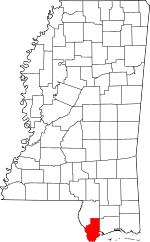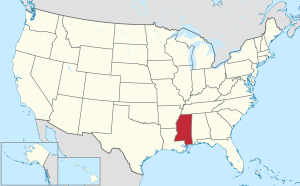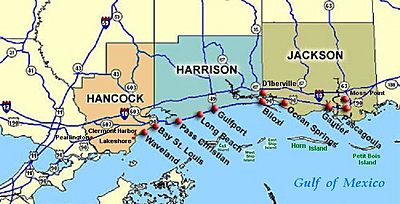Hancock County, Mississippi facts for kids
Quick facts for kids
Hancock County
|
|
|---|---|

Hancock County courthouse in Bay St. Louis
|
|

Location within the U.S. state of Mississippi
|
|
 Mississippi's location within the U.S. |
|
| Country | |
| State | |
| Founded | 1812 |
| Named for | John Hancock |
| Seat | Bay St. Louis |
| Largest city | Bay St. Louis |
| Area | |
| • Total | 553 sq mi (1,430 km2) |
| • Land | 474 sq mi (1,230 km2) |
| • Water | 79 sq mi (200 km2) 14% |
| Population
(2020)
|
|
| • Total | 46,053 |
| • Estimate
(2023)
|
46,159 |
| • Density | 83.28/sq mi (32.154/km2) |
| Time zone | UTC−6 (Central) |
| • Summer (DST) | UTC−5 (CDT) |
| Congressional district | 4th |
Hancock County is the southernmost county of the U.S. state of Mississippi and is named for Founding Father John Hancock. As of the 2020 census, the population was 46,053. Its county seat is Bay St. Louis. Hancock County is part of the Gulfport–Biloxi, MS Metropolitan Statistical Area. It is situated along the Gulf of Mexico and the state line with Louisiana. The area is home to the John C. Stennis Space Center, NASA's largest rocket engine test facility. The county was severely damaged from Hurricane Katrina on August 29, 2005, which caused a huge storm surge and catastrophic damage.
Contents
History
This area of Mississippi was inhabited by indigenous peoples at the time of European colonization; the French were the first settlers and traders in the area. They imported African slaves as laborers, and in time a Creole class of free people of color developed.
After the United States conducted Indian Removal in the 1830s, more Protestant Americans migrated into this area, but it retained French and African Catholic influences. Located on the Gulf Coast, the county was regularly hit by hurricanes but its residents learned to handle these incidents.
In 2005, the county was the scene of the final landfall of the eye of Hurricane Katrina, and its communities and infrastructure suffered some of the most intense damage inflicted by that storm. Over the entire 7-mile (11 km) beach front, not one building or home was left intact. Nearly the entire first block off the beach was destroyed for the entire 7-mile (11 km) stretch.
Homes as far inland as 10 miles (16 km) were flooded by the historic storm surge, which occurred during a full moon high tide. All rivers and waterways were inundated by the surge. Highway 603 south from Interstate 10 was completely submerged, and the Highway 90 - Bay St. Louis Bridge was left looking like a stack of dominoes.
Houses were floated off their foundations. In Waveland and Bay St. Louis, some homes were stranded atop the railroad tracks and others in the middle of streets. Towns like Pearlington, Waveland, Bay St. Louis, Diamondhead, and Kiln suffered catastrophic damage.
Recovery from Hurricane Katrina
A loosely knit group of hippies called the "Rainbow Family" arrived in Hancock County soon after Hurricane Katrina. From early September 2005 to early December 2005, they ran the "New Waveland Cafe and Clinic" located in the parking lot of Fred's Dept Store on Highway 90.
The café provided free hot meals three times a day. The clinic was staffed by volunteer doctors and nurses from around the United States who saw more than 5000 patients during the duration. They provided treatment free of charge and dispensed free medications. Donations of medications and supplies came from a multitude of sources, with International Aid arranging the most donations. This was the first experience of the Rainbow Family in running a disaster relief center. The Bastrop Christian Outreach Center also volunteered with the Rainbow Family.
Local churches were central points of recovery in Bay St. Louis, Waveland, and Diamondhead. Some churches provided shelter, meals, clothing, and various clean-up supplies. The churches also provided distribution points where supplies could be donated and easily passed on to those who needed help. Other disaster relief agencies that were active in Hancock County include Samaritan's Purse, Southern Baptist Convention Disaster Relief, Red Cross, Rotary International and Salvation Army.
Businesses became operational as quickly as possible. The Waveland Wal-Mart operated out of a tent for 3 months following the storm; Diamondhead Discount Drug was opened within 2 days following Katrina, although the owner's store and home were both severely damaged. Other business such as Dairy Queen and Subway donated their foodstuffs, before it could spoil, in order to feed survivors.
Geography
According to the U.S. Census Bureau, the county has a total area of 553 square miles (1,430 km2), of which 474 square miles (1,230 km2) is land and 79 square miles (200 km2) (14%) is water.
Major highways
 Interstate 10
Interstate 10 U.S. Highway 90
U.S. Highway 90 Mississippi Highway 43
Mississippi Highway 43 Mississippi Highway 53
Mississippi Highway 53 Mississippi Highway 603
Mississippi Highway 603 Mississippi Highway 607
Mississippi Highway 607
Adjacent counties and parishes
- Pearl River County (north)
- Harrison County (east)
- St. Bernard Parish, Louisiana (south)
- St. Tammany Parish, Louisiana (west)
Demographics
| Historical population | |||
|---|---|---|---|
| Census | Pop. | %± | |
| 1820 | 1,594 | — | |
| 1830 | 1,962 | 23.1% | |
| 1840 | 3,367 | 71.6% | |
| 1850 | 3,672 | 9.1% | |
| 1860 | 3,139 | −14.5% | |
| 1870 | 4,239 | 35.0% | |
| 1880 | 6,439 | 51.9% | |
| 1890 | 8,318 | 29.2% | |
| 1900 | 11,886 | 42.9% | |
| 1910 | 11,207 | −5.7% | |
| 1920 | 10,380 | −7.4% | |
| 1930 | 11,415 | 10.0% | |
| 1940 | 11,328 | −0.8% | |
| 1950 | 11,891 | 5.0% | |
| 1960 | 14,039 | 18.1% | |
| 1970 | 17,387 | 23.8% | |
| 1980 | 24,537 | 41.1% | |
| 1990 | 31,760 | 29.4% | |
| 2000 | 42,967 | 35.3% | |
| 2010 | 43,929 | 2.2% | |
| 2020 | 46,053 | 4.8% | |
| 2023 (est.) | 46,159 | 5.1% | |
| U.S. Decennial Census 1790-1960 1900-1990 1990-2000 2010-2013 2019 |
|||
| Race | Num. | Perc. |
|---|---|---|
| White (non-Hispanic) | 37,341 | 81.08% |
| Black or African American (non-Hispanic) | 3,911 | 8.49% |
| Native American | 244 | 0.53% |
| Asian | 424 | 0.92% |
| Pacific Islander | 9 | 0.02% |
| Other/Mixed | 2,206 | 4.79% |
| Hispanic or Latino | 1,918 | 4.16% |
As of the 2020 United States census, there were 46,053 people, 20,036 households, and 13,081 families residing in the county.
Hancock is the only county in Mississippi where Roman Catholics outnumber Baptists. Catholics comprise a plurality of residents of Hancock County, owing to the county's French colonial heritage and proximity to deeply Catholic Southern Louisiana.
Communities
Cities
- Bay St. Louis (county seat)
- Diamondhead
- Waveland
Census-designated places
Unincorporated communities
- Ansley
- Clermont Harbor
- Lakeshore
- Leetown
- Napoleon
- Necaise
- Shoreline Park (former CDP)
Ghost towns
- Gainesville
- Logtown
Education
School districts include:
- Bay St. Louis School District
- Hancock County School District
- Picayune School District
See also
 In Spanish: Condado de Hancock (Misisipi) para niños
In Spanish: Condado de Hancock (Misisipi) para niños


